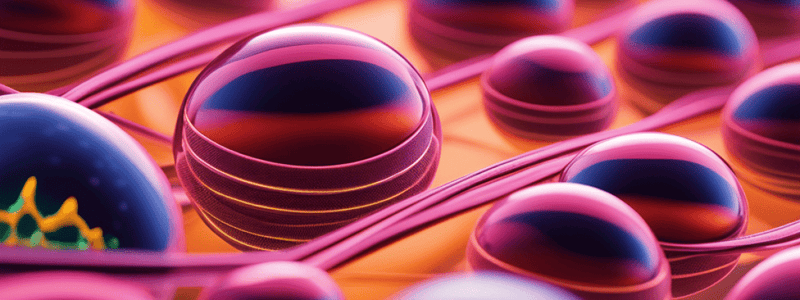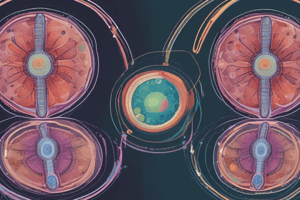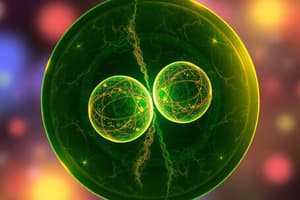Podcast
Questions and Answers
What is one of the consequences of an imbalance in the cell cycle?
What is one of the consequences of an imbalance in the cell cycle?
Why is understanding cell division important in education?
Why is understanding cell division important in education?
How do drugs targeting specific cell cycle proteins contribute to medicine?
How do drugs targeting specific cell cycle proteins contribute to medicine?
What do researchers uncover by investigating the intricate details of cell division?
What do researchers uncover by investigating the intricate details of cell division?
Signup and view all the answers
What does PROKLAS measure in laboratory assistants in biochemistry and cell biology?
What does PROKLAS measure in laboratory assistants in biochemistry and cell biology?
Signup and view all the answers
In conclusion, what does continued research into the mechanisms of cell division contribute to?
In conclusion, what does continued research into the mechanisms of cell division contribute to?
Signup and view all the answers
What is the main process by which a single cell duplicates its genetic material and divides into two identical daughter cells?
What is the main process by which a single cell duplicates its genetic material and divides into two identical daughter cells?
Signup and view all the answers
During which stage of cell division do chromosomes align at the center of the cell?
During which stage of cell division do chromosomes align at the center of the cell?
Signup and view all the answers
What is the phase where the nuclear envelope breaks down and spindle fibers attach to chromosomes?
What is the phase where the nuclear envelope breaks down and spindle fibers attach to chromosomes?
Signup and view all the answers
Which stage involves the separation of chromosomes and their movement to opposite poles of the cell?
Which stage involves the separation of chromosomes and their movement to opposite poles of the cell?
Signup and view all the answers
What phase involves the disassembly of spindle fibers and the reforming of the nuclear envelope around separated sets of chromosomes?
What phase involves the disassembly of spindle fibers and the reforming of the nuclear envelope around separated sets of chromosomes?
Signup and view all the answers
Which process involves the cytoplasm dividing to form two daughter cells?
Which process involves the cytoplasm dividing to form two daughter cells?
Signup and view all the answers
Study Notes
Diving into Cell Division: A Pivotal Process in Cell Biology
Cell division, a fundamental aspect of cell biology, is the process by which a single cell duplicates its genetic material and divides into two identical daughter cells. This cyclical process ensures that life can grow, develop, and repair itself. Understanding cell division helps us comprehend the workings of life at its most basic level and aids in the development of medical treatments and biotechnological advancements.
Key Stages of Cell Division
Cell division can be divided into two main categories: mitosis (somatic cell division) and meiosis (germ cell division). Both processes involve distinct stages:
- Interphase: During this phase, the cell grows and duplicates its genetic material, which includes DNA replication.
- Prophase: Chromatin condenses into chromosomes, and the nucleolus disappears.
- Prometaphase: The nuclear envelope breaks down, and spindle fibers attach to chromosomes.
- Metaphase: Chromosomes align at the center of the cell (metaphase plate).
- Anaphase: Chromosomes separate and move to opposite poles of the cell.
- Telophase: Spindle fibers disassemble, and the nuclear envelope reforms around the separated sets of chromosomes.
- Cytokinesis: The cytoplasm divides, and two daughter cells are formed.
Cell Division and its Consequences
Cell division is essential for generating new cells to replace damaged or dead cells, for growth, and for the development of multicellular organisms. However, it can also contribute to disease and disorder, such as cancer. An imbalance in the cell cycle can lead to uncontrolled cell growth and division, which is a hallmark of cancer.
Scientists continue to study cell division to understand its fundamental mechanisms and to apply this knowledge to various fields, including medicine, biotechnology, and agriculture. The development of drugs targeting specific cell cycle proteins has led to new treatments for cancer and other diseases.
The Role of Cell Division in Education and Research
Understanding cell division is a cornerstone of cell biology education. Students study the process to grasp fundamental biological concepts like genetics, heredity, and the organization of living organisms. Researchers continue to investigate the intricate details of cell division, uncovering new insights into the mechanisms of life and disease.
Prospective laboratory assistants and researchers in biochemistry and cell biology must possess a foundational understanding of cell division. Assessment instruments like PROKLAS (Empirical Research in Vocational Education and Training) measure the professional knowledge of laboratory assistants in biochemistry and cell biology, ensuring that these professionals have the necessary skills to conduct their work safely and effectively.
In conclusion, cell division is a fundamental process in cell biology that ensures the continuity of life by generating new cells. Understanding cell division helps us comprehend the complex mechanisms of life and disease, and it provides the foundation for future advancements in medicine, biotechnology, and agriculture. Continued research into the mechanisms of cell division will further our understanding of life and contribute to the development of new treatments and technologies.
Studying That Suits You
Use AI to generate personalized quizzes and flashcards to suit your learning preferences.
Description
Delve into the pivotal process of cell division, crucial for growth, development, and repair in living organisms. Learn about the key stages of mitosis and meiosis, the consequences of cell division in health and disease, and the significance of understanding cell division in education and research.




